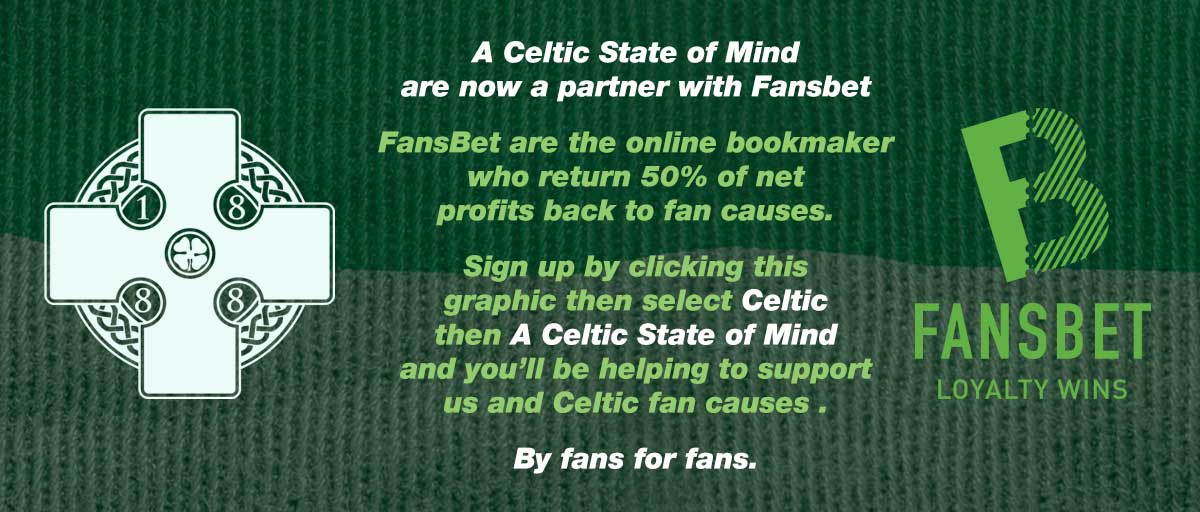As I was walking down the lane
I was feeling fine and larky oh
A recruiting sergeant said to me
Wouldn’t you look fine in khaki oh?
For the King he is in need of men
Come read this proclamation oh
And a life in Flanders for you then
Will be a fine vacation oh

The above lines from the song “Recruiting Sergeant” reflect, perhaps, the perception that many Celtic fans today have of the attitude of the Glasgow Irish towards Britain’s participation in World War One (the “Great War”) – a period that witnessed tumultuous events on both sides of the Irish Sea.
And so it was an education to listen to Ian McCallum last week on the “A Celtic State Of Mind” Podcast. McCallum has so far written, published and distributed (!) three books of what will eventually be a quite magnificent six volume history of “The Celtic, the Glasgow Irish and the Great War”. The series sets out to tell the story of the Irish community in Glasgow and their support for and attitudes towards the British war effort over the course of WW1. It truly is the definitive account of that particular passage of history and one that has Celtic Football Club running as a constant thread throughout. The fourth book in the series – “The Blood Sacrifice” – is due to be published very shortly. I can’t wait.
McCallum talks of the very significant drop in attendances at Celtic Park during the early years of the Great War (90000 in season 1914/15 alone) as Celtic supporters enlisted. These supporters were volunteers – conscription was not introduced until 1916.
McCallum goes on to explain the extraordinarily difficult circumstances in which the Celtic team was forced to play during WW1. Football was cancelled in England but the Scottish League made the decision to play on. McCallum details how the Celtic players, in common with those at other clubs, had to accept a massive wage cut and return to their former trades while turning out for the team on a Saturday. In doing so, he dispels the myth that Willie Maley found “safe” jobs for his players during the war; the Celtic players were treated no differently to those elsewhere. Some received white feathers by way of thanks; it must have been horrendous.
And yet that Celtic team won ten league titles, five Scottish Cups, eight Charity Cups and nine Glasgow FA Cups (these latter tournaments were no small affairs, attracting huge galleries) during the period from 1905 to 1917. The Celtic sides of that era included some of the greatest Celts of all time: Patsy Gallacher, Jimmy Quinn, Jimmy McMenemy, Sunny Jim Young, Jimmy “The Sniper” McColl and the man they called “The Icicle” – Alec McNair. Between the sticks was Charlie Shaw (256 shut outs in 492 appearances) and at centre half was Peter Johnstone.
Johnstone was the most famous Celt and, arguably, the most high profile British footballer killed during the Great War. He spent the first two years of the conflict down a mine, emerging to play for the Hoops on a Saturday, but joined the army in 1916 and was blown to smithereens at Arras the following year. He has no known grave. McCallum explains that rivalries were set aside as news of his death filtered back home. “Glasgow fell silent”, he says.
McCallum also debunks the notion that Celtic should today surrender the 1914/15 league title to Hearts on the basis that Celtic pipped Hearts to the title that season and that many of the Hearts first teamers were part of George McCrae’s Battalion (also known as the 16th Battalion, the Royal Scots). Their participation and that of players from other teams in the East, including Hibernian, ensured that within a week McCrae had 1350 men – a phenomenal effort. McCallum explains that many of the Hearts players never actually left Edinburgh but were involved in “military training” and available to play on a Saturday – not very different, perhaps, from the lot of the Celtic players employed in “war related” work for twelve hours a day from Monday to Friday.
With Celtic having no game on Saturday, I listened to the ACSOM podcast en route to Fraserburgh for a Highland League match between the local side, known as “The Broch”, and Wick Academy. Why? Why not? Daniel Gray, in the latest edition of The Nutmeg (the excellent Scottish Football Quarterly) describes the Highland League as almost a footballing idyll, one “providing a glimpse of everything the game can be”.
I know what he means: this is senior football and as hard and unyielding as the granite of the houses that surround Fraserburgh’s Bellslea Park as it clings to the coast in this most north easterly corner of Aberdeenshire. But it is also an incredibly friendly league and one where loyalties run deep. It is not at all unusual for players to play for the same team for a decade or more; all but one of the Wick first team live in Wick or neighbouring Thurso.
I wrote last time of the match that Celtic played against Liverpool in April 1989 to facilitate the Reds’ return to football after Hillsborough. And there in the Fraserburgh board room was another reminder of why Celtic is such a special club: proudly displayed next to the bar is a poster for the match that Celtic played against Fraserburgh at Bellslea on 28th April 1970 – just a week or so before the small matter of the European Cup Final in Milan!
But Celtic were in Fraserburgh for a very worthy cause: the match was played to raise funds for the families of the five men who perished in the Fraserburgh Life Boat disaster in January of that year (the third such disaster to afflict Fraserburgh in the twentieth century).
And this was no Celtic second string that was sent north. Alongside the match poster is a picture of the two teams lining up side by side before the game. The ruddy, wind-swept faces of Murdoch, McNeil, Lennox, Wallace, Auld, Craig, Hay, Johnston and Hughes stare back at me. Celtic means different things to different people but we can be proud of our history for more reasons than one. It really is a grand old team to play for…
David Sleight
Listen to the award-winning A Celtic State of Mind podcast

Leave a Reply
You must be logged in to post a comment.